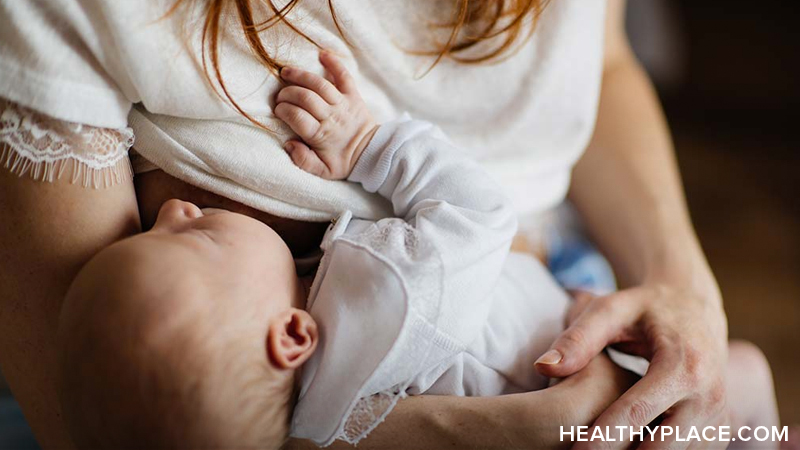Postpartum Depression and Breastfeeding: Effects, Safe Treatments

Postpartum depression and breastfeeding can sometimes work together to make life miserable for mothers who want to nurse their baby peacefully. Problems with breastfeeding can be a significant stressor in life after childbirth, a stressor that can affect mental health. Indeed, breastfeeding and postpartum depression (PPD) can both be challenges to the quality of life of both mother and newborn.
Breastfeeding problems create effects in multiple areas of a woman’s life:
- Biology (physical health problems throughout her body)
- Psychology (depression, anxiety, self-concept, ability to bond with the baby)
- Social (PPD and breastfeeding problems can lead to withdrawal and isolation, marriage difficulties, and struggles with other children)
Studies have identified a link between postpartum depression and breastfeeding difficulties. One such study found that mothers who experienced nursing difficulties in the first two weeks after childbirth were more likely to develop PPD than those who did not (Rochman, 2011).
Postpartum Depression While Breastfeeding
PPD is more common in women who have difficulty nursing their newborns. A significant part of a mother’s interaction with her new baby happens during feedings. This special time is a major source of infant-mother bonding.
When a mother can’t successfully nurse, painful effects often ensue:
- Feelings of low self-confidence and low self-worth
- Guilt that interferes in daily life
- Stress that can lead to postpartum depression and postpartum anxiety
This mental health challenge can occur while trying to breastfeed. Postpartum depression can also happen after stopping breastfeeding. Women stop for myriad reasons, all personal and all perfectly okay despite a society that often says otherwise.
Pain, lack of sufficient milk production, difficulty getting the baby to latch, and breast infection are effects of nursing difficulties that contribute to postpartum depression. Pain is strongly correlated to PPD. All types of depression increase pain sensitivity, so women with PPD likely experience higher levels of pain than those without PPD. Additionally, women who experience breastfeeding pain are twice as likely to develop PPD. (Rochman, 2011).
Breastfeeding difficulties are linked to postpartum depression; however, they’re not the only factor that plays a role in a woman’s PPD.
Postpartum Depression and Breastfeeding: More Contributing Factors
Women can face outside forces as well as actions taking place within her own body. The following factors can contribute to or exacerbate PPD:
- Societal pressure (the “Breast is Best” campaign can feel like a rigid law)
- Fear of judgment by others contributes to depression and anxiety
- Trying to seek help but feeling judged, pressured, and condemned
- Extreme stress and frustrations that compromise mental health
- Feelings of guilt, shame
- Hormonal changes (a drop in estrogen and progesterone after giving birth as well as low levels of oxytocin
Treatment for PPD can help reduce or eliminate PPD.
Postpartum Depression Treatment While Breastfeeding: What’s Safe?
If you’d like to continue breastfeeding while treating postpartum depression but are worried about your baby’s health and safety, you can be encouraged by the treatment options available. Some involve medication, while others do not.
Many treatment approaches for PPD don’t involve medication. Reading up on PPD and breast- versus bottle feeding empowers you to make decisions that are right for you and your baby. Working with a therapist can help a great deal as well. In addition to working on postpartum depression symptoms, you and your counselor can work to come to terms with stopping breastfeeding if you need or want to do so. You’ll build knowledge and confidence.
Medication is a legitimate treatment for postpartum depression. Taking certain antidepressants for postpartum depression while breastfeeding doesn’t harm your baby even if small amounts pass into breastmilk. Some, however, are more toxic when they find their way into breastmilk and can be harmful to infants. When talking to your doctor about prescription medication for PPD, always mention that you’re breastfeeding, so you receive the best medication for you and your baby.
The best medication for postpartum depression and anxiety during breastfeeding is a class known as selective serotonin reuptake inhibitors (SSRIs). SSRIs help PPD without entering breastmilk. Some of the most commonly prescribed SSRIs for PPD include:
- Celexa (citalopram)
- Effexor (venlafaxine)
- Lexapro (escitalopram)
- Paxil, Pexeva (paroxetine)
- Prozac, Sarafem (fluoxetine)
- Wellbutrin, Zyban (bupropion)
- Zoloft (sertraline)
While all these antidepressants have been deemed safe, citalopram and fluoxetine have a higher risk of being secreted into breastmilk.
Benzodiazepines (sedatives) may sometimes also be considered, but they are highly controversial and viewed by many healthcare professionals to be dangerous. Medications like Ativan (lorazepam), Klonopin (clonazepam), Valium, Diastat (diazepam), and Xanax (alprazolam) enter breastmilk and have dangerous side-effects for a baby. Babies can lose weight and become lethargic.
When deciding on antidepressants and breastfeeding, consider this: The biggest risk to a newborn baby isn’t any PPD treatment but rather the lack of treatment that can interrupt mother-baby bonding and healthy development. Taking care of yourself and overcoming PPD is the best gift you could give yourself and your baby.
If you decide to forego breastfeeding during postpartum depression, consider Zulresso (brexanolone), the first drug specifically for postpartum depression.
APA Reference
Peterson, T.
(2022, January 3). Postpartum Depression and Breastfeeding: Effects, Safe Treatments, HealthyPlace. Retrieved
on 2025, April 20 from https://www.healthyplace.com/depression/postpartum-depression/postpartum-depression-and-breastfeeding-effects-safe-treatments



